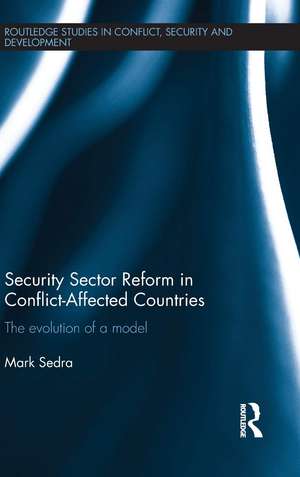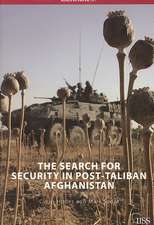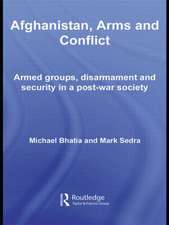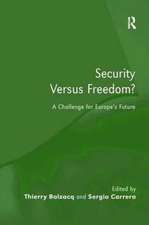Security Sector Reform in Conflict-Affected Countries: The Evolution of a Model: Routledge Studies in Conflict, Security and Development
Autor Mark Sedraen Limba Engleză Hardback – 27 oct 2016
Since its emergence as a concept in the late 1990s, SSR has represented a paradigm shift in security assistance, from the realist, regime-centric, train-and-equip approach of the Cold War to a new liberal, holistic and people-centred model. The rapid rise of this model, however, belied its rather meagre impact on the ground. This book critically examines the concept and its record of achievement over the past two decades, putting it into the broader context of peace-building and state-building theory and practice. It focuses attention on the most common, celebrated and complex setting for SSR, conflict-affected environments, and comparatively examines the application and impacts of donor-supported SSR programing in a series of conflict-affected countries over the past two decades, including Afghanistan, Sierra Leone, the Democratic Republic of Congo, East Timor and Bosnia-Herzegovina. The broader aim of the book is to better understand how the contemporary SSR model has coalesced over the past two decades and become mainstreamed in international development and security policy and practice. This provides a solid foundation to investigate the reasons for the poor performance of the model and to assess its prospects for the future.
This book will be of much interest to students of international security, peacebuilding, statebuilding, development studies and IR in general.
Preț: 1060.25 lei
Preț vechi: 1292.98 lei
-18% Nou
Puncte Express: 1590
Preț estimativ în valută:
202.88€ • 212.36$ • 168.86£
202.88€ • 212.36$ • 168.86£
Carte tipărită la comandă
Livrare economică 31 martie-14 aprilie
Preluare comenzi: 021 569.72.76
Specificații
ISBN-13: 9781138933910
ISBN-10: 1138933910
Pagini: 352
Ilustrații: 6
Dimensiuni: 156 x 234 x 25 mm
Greutate: 0.61 kg
Ediția:1
Editura: Taylor & Francis
Colecția Routledge
Seria Routledge Studies in Conflict, Security and Development
Locul publicării:Oxford, United Kingdom
ISBN-10: 1138933910
Pagini: 352
Ilustrații: 6
Dimensiuni: 156 x 234 x 25 mm
Greutate: 0.61 kg
Ediția:1
Editura: Taylor & Francis
Colecția Routledge
Seria Routledge Studies in Conflict, Security and Development
Locul publicării:Oxford, United Kingdom
Public țintă
Postgraduate, Professional, and UndergraduateCuprins
Introduction
1. Security Sector Reform and the the Liberal Peace
2. The Origins and Evolution of the Security Sector Reform Model
3. Assessing the Security Sector Reform Model in Conflict-Affected Countries
4. The Ultimate Test: An Overview of Afghanistan’s Security Sector Reform Process
5. The Slide toward Expediency in Afghanistan: From Orthodox Security Sector Reform to Realist Train and Equip
Conclusion
1. Security Sector Reform and the the Liberal Peace
2. The Origins and Evolution of the Security Sector Reform Model
3. Assessing the Security Sector Reform Model in Conflict-Affected Countries
4. The Ultimate Test: An Overview of Afghanistan’s Security Sector Reform Process
5. The Slide toward Expediency in Afghanistan: From Orthodox Security Sector Reform to Realist Train and Equip
Conclusion
Notă biografică
Mark Sedra is an Adjunct Assistant Professor in the Department of Political Science at the University of Waterloo and the Balsillie School of International Affairs, Canada. He is author/editor of five books.
Recenzii
'Mark Sedra’s book, Security Sector Reform in Conflict-Affected Countries: The Evolution of a Model, aims at demonstrating the recent dilemmas facing SSR, by presenting its core pillars and assessing the model in conflict-affected countries. The author provides an in-depth case study of Afghanistan demonstrating all its implementation phases, the actors involved, and, last but not least, the flaws and inconsistencies generated by the tensions between local and international actors.'--Ricardo Oliveira dos Santos, Journal of Intervention and Statebuilding, 2019
Descriere
This book charts the emergence and historical progression of the Security Sector Reform (SSR) model from its infancy at the end of the Cold War up to 2014, with a special focus on the case of Afghanistan.



















